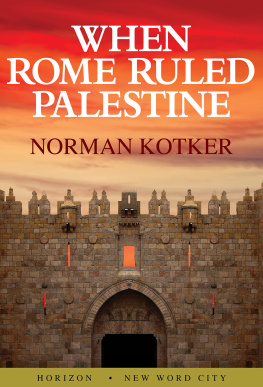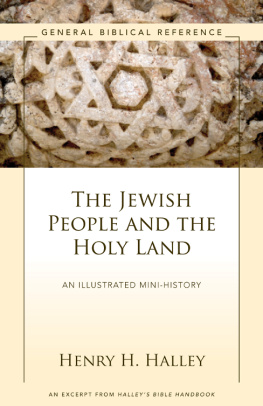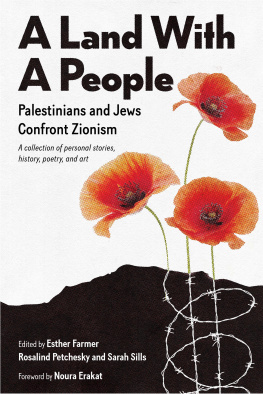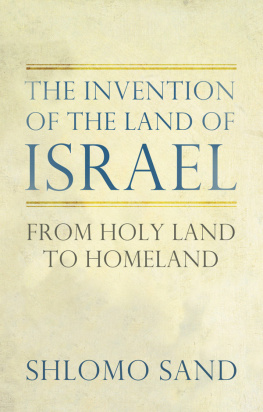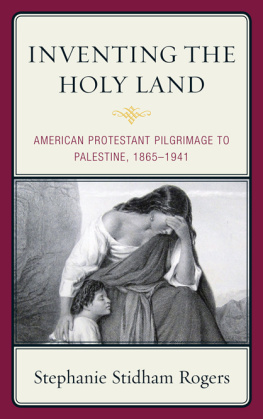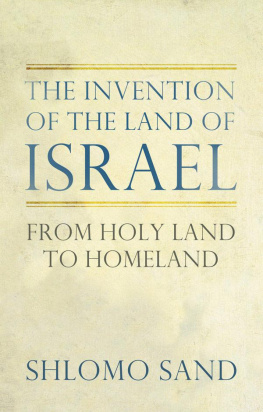ROUTLEDGE LIBRARY EDITIONS: ISRAEL AND PALESTINE
Volume 6
LAND PROBLEMS IN PALESTINE
LAND PROBLEMS IN PALESTINE
A. GRANOVSKY
With a foreword by
THE RT. HON. J. C. WEDGWOOD, D.S.O., M.P.
First published in English in 1926
This edition first published in 2015
by Routledge
2 Park Square, Milton Park, Abingdon, Oxon, OX14 4RN
and by Routledge
52 Vanderbilt Avenue, New York, NY 10017
Routledge is an imprint of the Taylor & Francis Group, an informa business
2015 Taylor & Francis
All rights reserved. No part of this book may be reprinted or reproduced or utilised in any form or by any electronic, mechanical, or other means, now known or hereafter invented, including photocopying and recording, or in any information storage or retrieval system, without permission in writing from the publishers.
Trademark notice: Product or corporate names may be trademarks or registered trademarks, and are used only for identification and explanation without intent to infringe.
British Library Cataloguing in Publication Data
A catalogue record for this book is available from the British Library
ISBN: 978-1-138-89267-5 (Set)
eISBN: 978-1-315-69513-6 (Set)
ISBN: 978-1-138-90473-6 (Volume 6)
Publishers Note
The publisher has gone to great lengths to ensure the quality of this reprint but points out that some imperfections in the original copies may be apparent.
Disclaimer
The publisher has made every effort to trace copyright holders and would welcome correspondence from those they have been unable to trace.
LAND PROBLEMS IN
PALESTINE
BY
A. GRANOVSKY
Authorised Translation
WITH A FOREWORD BY
The Rt. Hon. J. C. WEDGWOOD, D.S.O., M.P.
Printed in England by
John Roberts Press Ltd., London
TABLE OF CONTENTS
by The Rt. Hon. J. C. Wedgwood, D.S.O., M.P.
_________________________________
NOTES.
The unit of measure for rural land in Palestine is: 1 dunam = 1,600 square pic = 919 square meters = 1/11 hectar = 0,23 acre.
The unit of measure for urban land is: I square pic = 75 square centimeters = 29,53 inches.
The present Palestinian monetary unit is the Egyptian pound (E). The value of the Egyptian pound (E) as compared with the pound sterling () is as 100 to 97.5.
The calendar used by the Jews in Palestine is that of the Jewish year (which is dated according to the Jewish tradition of the creation of the world). It runs, approximately, from October to September 30.
The land question in Palestine is evoking unprecedented interest on the part of the Jewish public. This display of interest is not to be accounted for solely by the first signs of speculation in land. Rather, the problems of Jewish land policy have been precipitated into the foreground because all Zionist groups are coming to realize ever more clearly the decisive rle which the soil itself is bound to play in Jewish Palestine. As the reconstruction progresses, recognition grows that by the mode of its land tenure the Jewish National Home will stand or fall.
That national ownership of soil is imperative for Erez Israel (Jewish Palestine) has long been understood. Some twenty-five years ago the Zionist Organization established the Jewish National Fund (Keren Kayemet le-Israel) as its agency for bringing the largest possible amount of Jewish land in Palestine into the national possession. The National Fund was thus made the standard bearer of national Jewish land policy in Palestine.
The present series of ten essays is devoted to various phases of the land policy of the National Fund. A single thought runs through the whole: that the Jewish Homeland can be erected only upon nationalized land. With the development of the upbuilding work, all Jewish land in Palestine must and will in time be brought into public ownership. New and wholesome conditions of land tenure for Jewish settlement are being created by the National Fund through a policy which incorporates the characteristic social and national aims of the Reconstruction.
A healthy Jewish commonwealth can grow only out of a free soil. Hence the aim which the National Fund has set itself : to win a free soil for a free people.
A. G.
Jerusalem, June 3, 1925.
By Right Honourable J. C. Wedgwood, D.S.O., M.P.
Every Zionist knows that the success of this Judeo-British venture depends upon the Jews getting land to use in Palestine. If they cannot use the land, Jews cannot stop in Palestine. Successful immigration depends on land being available, and the more there is available, the sooner shall we have a Jewish majority and a safe Homeland. Moreover, the ethical or moral value of the successful colonization of Palestine by the Jews depends on showing that, given a chance, Jews can be as good producers (even producers of food by hard labour) as any other colonial racethat they are men, not middlemen. And this too means the creative use of land such as can be done under the best conditions and on the best terms.
There is, therefore, need of a book on Land Problems in Palestine. Dr. Granovskys book, translated from the Hebrew, deals with the problems of the acauisition, tenure, administration and control of Jewish land in Palestinerural and urban and it is thoroughly documental from continental (chiefly German) sources. It was felt, however, that the book would gain by a glance at the problem from the British Colonial side also. The due balance of (British) individual liberty with (German) regulation and direction is as much required in Jewish land problems as it is fortunately found in Jewish human nature.
AGRICULTURAL COLONIZATION
In our objects, the German and the Englishman are at one. Dr. Granovsky is as anxious as I am to show that agricultural success is everythingall that really matters. And he, like myself, sees in the family-farm the foundations of freedom. We want no hired labour, no landless serfs, but free JewsAuf freiem Grund mit freiem Volke stehn was good enough for Faust, and it is good enough for us. That the J.N.F. should own the land of Palestine and lease the land on hereditary lease in family-holding areas, at revisable rents, based on land value alone, is our common ground. We would both extend the term family to cover any Marxian or co-operative community which desired to lease and operate in common.
Dr. Granovsky, however, sees in the ownership of the J.N.F. a means of directing and restricting the freedom of the peasant leaseholders; to this I am opposed in theory, and it is little likely to work in practice. He would make the lease for 49 yearsrenewable. I prefer perpetual leases, and I think he realizes that this is what it would amount to in practice. He approves of the restrictions in the leases preventing subdivision or amalgamation, requiring residence, and the limitation of tenancy to Jews. No one doubts that the J.N.F. Is entitled to make such restrictions, and that some of them are eminently desirable, but I do not think they can be enforced. Exceptions would have to be made in countless cases, till it would become manifestly unfair to refuse to some and allow to others. Intensely as I dislike the development of both sub-letting and the amalgamation of holdingsfor both spoil the principle of Self-Labour yet it has been found that private influence, and the dummying through male and female relations, always defeats such regulations. The most effective, indeed, I think the only effective way, to prevent landlordism arising, is the rigid insistence on the payment of a frequently-revised full land value rent. Sub-letting immediately starts directly there is a margin between the full land value enjoyed by the holder and the land value rent or tax paid to the Statesee, for instance, the results of the Ryotwari system in India. If the leaseholder is paying the full land value rent he has no incentive to sublet, for he gets no more than he pays; or, if he should extract more by reason of special shortage of land, he risks having the rent of his entire holding raised to match. As for amalgamations, in so far as they lead to increased production they should regretfully be accepted. It is the amalgamation to create a monopoly and to raise the price of the article monopolized, that injures others. If the amalgamator knows that the increased value of his monopoly will go to the State (or the J.N.F.) the laying fo farm to farm will lose its attractions.


